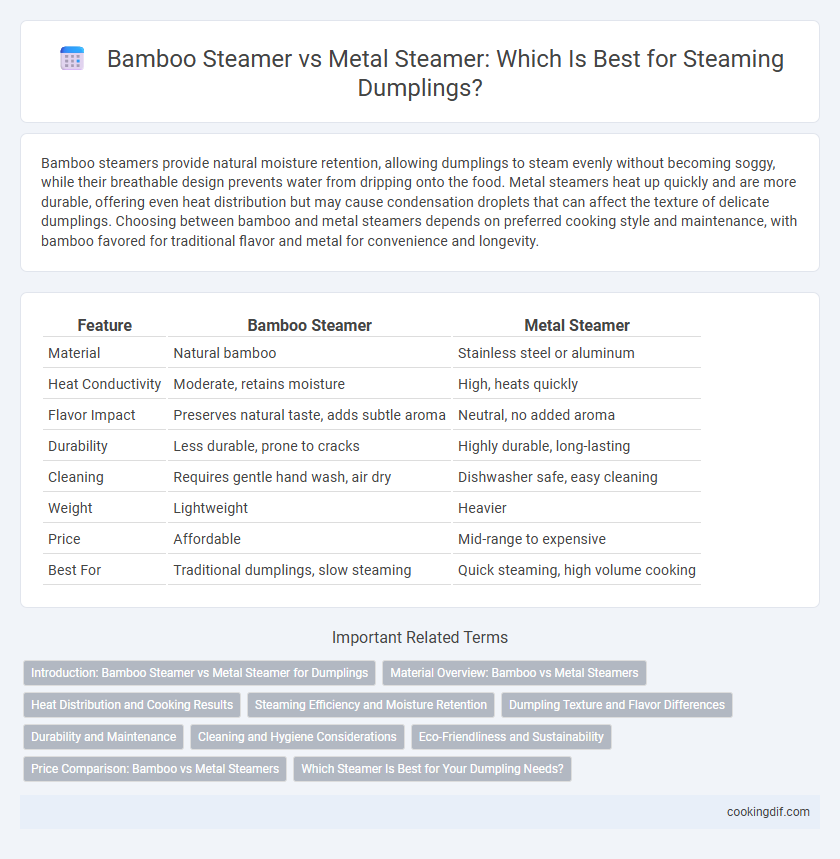Bamboo steamers provide natural moisture retention, allowing dumplings to steam evenly without becoming soggy, while their breathable design prevents water from dripping onto the food. Metal steamers heat up quickly and are more durable, offering even heat distribution but may cause condensation droplets that can affect the texture of delicate dumplings. Choosing between bamboo and metal steamers depends on preferred cooking style and maintenance, with bamboo favored for traditional flavor and metal for convenience and longevity.
Table of Comparison
| Feature | Bamboo Steamer | Metal Steamer |
|---|---|---|
| Material | Natural bamboo | Stainless steel or aluminum |
| Heat Conductivity | Moderate, retains moisture | High, heats quickly |
| Flavor Impact | Preserves natural taste, adds subtle aroma | Neutral, no added aroma |
| Durability | Less durable, prone to cracks | Highly durable, long-lasting |
| Cleaning | Requires gentle hand wash, air dry | Dishwasher safe, easy cleaning |
| Weight | Lightweight | Heavier |
| Price | Affordable | Mid-range to expensive |
| Best For | Traditional dumplings, slow steaming | Quick steaming, high volume cooking |
Introduction: Bamboo Steamer vs Metal Steamer for Dumplings
Bamboo steamers provide a natural, porous cooking environment that absorbs excess moisture, preventing dumplings from becoming soggy, while metal steamers offer faster heat conduction and greater durability. The layered design of bamboo steamers allows stacking multiple tiers for simultaneous cooking without compromising texture, whereas metal steamers often come with precise temperature control for consistent steaming. Choosing between bamboo and metal steamers depends on factors like heat distribution, moisture control, and cooking capacity tailored to dumpling preparation needs.
Material Overview: Bamboo vs Metal Steamers
Bamboo steamers offer natural insulation and moisture absorption, preserving the texture and flavor of dumplings by preventing condensation buildup. Metal steamers, typically made from stainless steel, provide faster heating and more even steam distribution, resulting in efficient cooking times. The choice between bamboo and metal steamers depends on preferences for traditional aesthetics and gentle steaming versus durability and quicker performance.
Heat Distribution and Cooking Results
Bamboo steamers provide gentle, even heat distribution, allowing dumplings to cook through without becoming soggy by absorbing excess moisture. Metal steamers conduct heat quickly and maintain higher temperatures, resulting in faster cooking but occasionally uneven heat distribution that can cause dumplings to stick or cook unevenly. Choosing a bamboo steamer enhances texture and flavor by preserving the delicate structure of dumplings, while metal steamers offer durability and speed for bulk cooking.
Steaming Efficiency and Moisture Retention
Bamboo steamers excel in moisture retention due to their natural porous structure, allowing steam to circulate gently and prevent condensation from dripping back onto dumplings, preserving their texture and flavor. Metal steamers offer faster steaming efficiency with direct heat conduction and durability, but they may cause water droplets to form and fall onto food, potentially making dumplings soggy. Choosing between bamboo and metal steamers depends on whether consistent moisture retention or rapid, high-heat steaming is prioritized for optimal dumpling preparation.
Dumpling Texture and Flavor Differences
Bamboo steamers preserve dumpling texture by allowing gentle, even steam circulation, preventing sogginess and maintaining a delicate chewiness. Metal steamers heat rapidly, which can create a firmer outer layer but risk altering the dumpling's soft interior and nuanced flavors. Choosing bamboo enhances the subtle, natural taste and tender texture of dumplings compared to the more intense, sometimes metallic taste imparted by metal steamers.
Durability and Maintenance
Bamboo steamers offer natural moisture absorption that prevents sogginess but require regular seasoning and careful drying to avoid mold and cracking, impacting their long-term durability. Metal steamers, typically made from stainless steel, provide superior durability and resist rust and warping, making them easier to maintain with simple cleaning and occasional polishing. Choosing between bamboo and metal steamers depends on balancing the rustic flavor enhancement and gentle steaming of bamboo with the robust, low-maintenance durability of metal options.
Cleaning and Hygiene Considerations
Bamboo steamers offer natural breathability and reduce moisture buildup, but can absorb food odors and require thorough drying to prevent mold and bacterial growth. Metal steamers, often made of stainless steel, are non-porous, easy to sanitize, and more resistant to staining and odor retention, enhancing overall hygiene. Regular cleaning with hot water and mild detergent is essential for both to maintain optimal food safety and prevent contamination while steaming dumplings.
Eco-Friendliness and Sustainability
Bamboo steamers offer eco-friendliness due to their biodegradable, renewable material sourced from fast-growing bamboo, reducing environmental impact compared to metal steamers. Metal steamers, often made from stainless steel, have a longer lifespan and are recyclable, which supports sustainability through durability and resource recovery. Choosing between bamboo and metal steamers depends on balancing biodegradable natural materials with the reusability and recyclability of metal for sustainable kitchen practices.
Price Comparison: Bamboo vs Metal Steamers
Bamboo steamers generally cost less than metal steamers, making them a budget-friendly choice for dumpling enthusiasts. Metal steamers, typically made from stainless steel, have a higher price point due to durability and heat conduction features. While bamboo steamers range from $15 to $30, metal steamers often start at $25 and can exceed $50 depending on size and brand.
Which Steamer Is Best for Your Dumpling Needs?
Bamboo steamers provide a natural, breathable environment that prevents condensation from dripping onto dumplings, preserving their delicate texture and flavor. Metal steamers heat up quickly and offer durability and versatility, but can cause moisture accumulation that may soggy the dumplings. Choosing between bamboo and metal steamers depends on prioritizing traditional texture and steam circulation versus faster heating and easier maintenance.
Bamboo Steamer vs Metal Steamer for steaming tool Infographic

 cookingdif.com
cookingdif.com